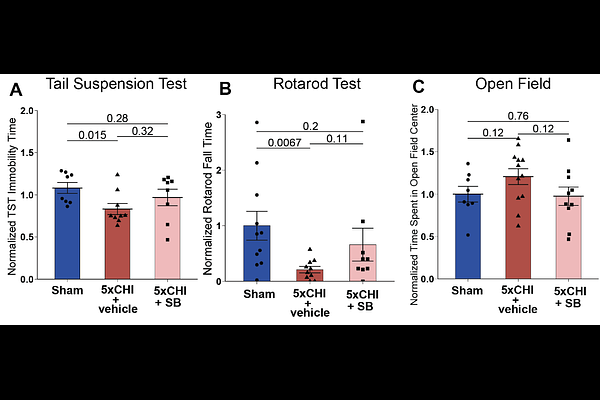Inhibition of p38 MAPK after repetitive mild TBI ameliorates immune signaling and behavioral deficits

Inhibition of p38 MAPK after repetitive mild TBI ameliorates immune signaling and behavioral deficits
Li, C.; Triplett, S. E.; Griffin, M.; Silverio, A.; Pettit, E.; Rohrer, A.; Callaway, J.; Munagapati, P.; Saah, P.; Sanz, P.; Rivera Moctezuma, F.; Buckley, E.; Wood, L. B.
AbstractBackground: Mild traumatic brain injury (mTBI) can cause long-term functional impairments, and repetitive mTBIs within a window of vulnerability can exacerbate these consequences compared to a single mTBI. However, current interventions for mTBI focus on alleviating symptoms, rather than targeting underlying mechanisms. Following the initial mechanical impact, increasing evidence suggests that the brain undergoes an inflammatory cascade consisting of pro-inflammatory intracellular signaling pathways and production of cytokines, ultimately leading to chronic neuroinflammation and persistent neurological deficits. Prior work in severe traumatic brain injury has shown that the p38 MAPK signaling pathway is a key regulator of microglial activation, proinflammatory cytokines, and synaptic dysfunction, but its role in the context of mTBI remains unclear. As such, this study aimed to determine if inhibition of p38 MAPK would attenuate the inflammatory response and longer-term functional deficits following a weight-drop mouse model of repetitive mTBI. Methods: C57BL/6J male and female mice were injected with a small molecule p38 MAPK inhibitor (SB239063) after each of 5 once-daily weight-drop closed head injuries (CHIs) or sham injuries. Functional outcome was assessed at 4-weeks post injury. Protein and transcriptional alterations associated with the immune response, synaptic function, microglial phenotype, and functional outcomes were assessed at both 4-hours and 4-weeks after the final CHI. Results: In females, acute inhibition of p38 MAPK attenuated i) cytokine expression and microglial reactivity at 4-hours post injury and ii) antidepressive-like behavior and synaptic loss at 4-weeks post injury. In males, p38 MAPK inhibition also attenuated microglial reactivity and up-regulation of specific cytokines, although changes in functional outcomes did not reach significance. Interestingly, bulk RNAseq analysis in both sexes showed that acute p38 MAPK inhibition both normalized the effects of injury and upregulated protective genes and pathways associated with recovery and maintenance of brain homeostasis. Together, these findings suggest a role for p38 MAPK in driving the acute and longer-term consequences post repetitive mTBI in a sex-dependent manner, and they suggest therapeutic potential of p38 MAPK inhibition. To our knowledge, this work is the first to investigate the effects of small molecule inhibitor SB239063 as a potential therapeutic treatment administrated following rmTBI.